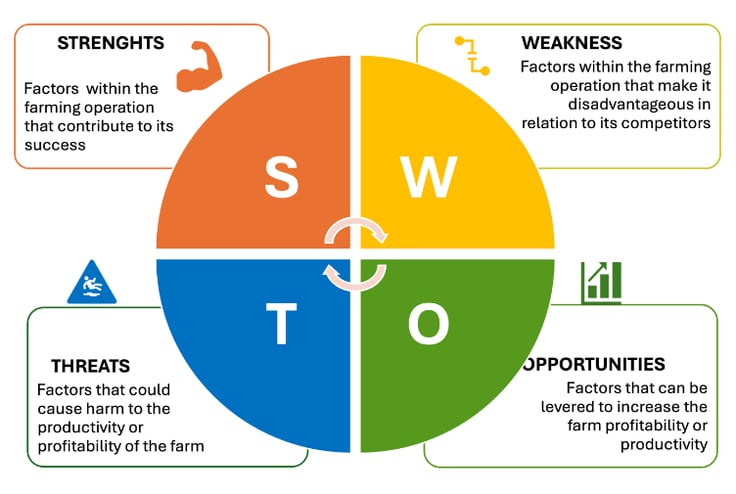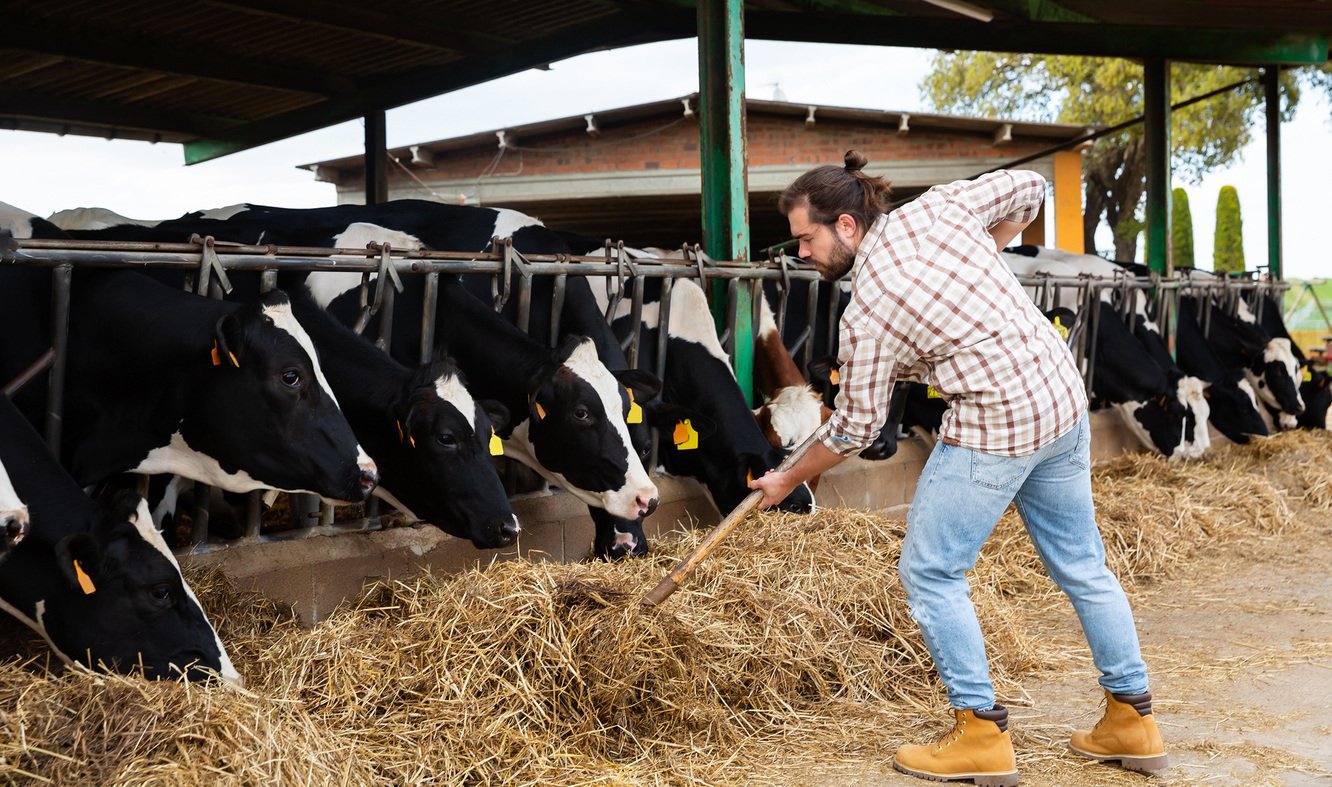Generational renewal in farming is a problem, specially in US and EU where farmers under 35-40 years of age make up about 11% (EU) and 10% (US) of producers. The agricultural sector is facing an increasing challenge: the shortage of young farmers. However, when looking at the economic, environmental and social challenges that our society is currently facing, agriculture is a sector that has a high potential to engage with younger generations in a meaningful way.
Starting a new farm is as starting any new business: it needs careful planning, management and adaptability to ensure success. This means to beyond daily farm operations and should include strategic decision-making, financial planning, resource allocation, and risk mitigation.
In this article we focus on what we think should be the five key tips when starting a new farm.
Prefer to listen to this article? Click the play button below and enjoy our podcast!
1. A farm is a business
Not thinking of our farm as a business is a fatal mistake. Start with your vision: what do you want to achieve? What are your goals with this farm? Then, start building the road to get there. However, this beautiful vision can rapidly turn into a nightmare if it is not properly planned.
Developing a solid business plan should be the most critical step in starting a new farm. A comprehensive business plan should outline the farm’s goals, identify target markets, and detail production strategies. A solid business plan needs also to include short and long term financial projections, namely forecast on income and expenditure and cash flow predictions. A well-defined business plan serves as a roadmap for the farm's growth and stability. Another issue that can be tackled right from the start is the succession plan for the farm.
Do not forget contingency plans to make up for unpredicted circumstances (adverse weather conditions, fluctuating market prices, and crop failures, world pandemics…). Understanding potential risks and preparing strategies to mitigate them is crucial. Even more when our business has Nature as the main business associate.
An important part of a business plan is the strengths, weaknesses, threats and opportunities analysis – SWOT. When planning the business, we need to systemize and write down, by looking inside of the farm, what are the strengths and weaknesses. On the other side, threats and opportunities are identified by looking at factors outside of the farm.

2. Benchmarking, mentoring and networking
Benchmarking is the practice of comparing business processes and performance. This is a valuable tool that will allow new farmers to compare their farm’s performance against others in the industry. This method helps identify strengths and areas for improvement, enabling new farmers to set realistic goals and improve overall efficiency. Understanding how other successful farms operate can provide invaluable insights for new farm owners.
Mentoring can/should also an excellent way to learn from experienced farmers. This will provide practical insights and avoid common mistakes associated with starting a new farm.
In every business networking is essential, why should farming be any different? Participating in farmer networks and knowledge exchange platforms (conferences, fairs, seminars, workshops,…) will significantly enhance the newcomer learning curve. Continuous knowledge exchange, fostering innovation and introducing new methods to increase farm productivity and sustainability is of high importance and should be cultivated from the start. Farmer cooperatives, associations, groups, can also provide access to valuable resources and support systems.
3. Farm management
This is a very wide subject.
Farmers may be temped to focus only on daily farm management of animals, like feeding, milking, cleaning, etc. But we need to program management of our farm as a whole, and look into future needs and outputs.
Finantial management is crucial to have a real time view of financial health of our farm. Financial management will aid in understanding the financial health of the business and help to identify ways to improve the profits (e.g. changing marketing strategy and/or reducing costs,…). To do this, maintaining accurate records and budgeting is key to an efficient and effective managing finances. This is fundamental into building a profitable farm and making informed decisions that promote long-term sustainability.
Human resource management is often overlooked, however, it plays an important role in the success of any farm. In family business farms, co-workers are family. The challenge is not to forget that they too are a part and a work force of the farm, and that our farm is also our business. In small-scale farms, involving family members in management decisions will contribute to the efficiency and sustainability of the business.
If the farms expands (or as it does), managing a workforce may become necessary, and recruiting, training, and retaining people can be a real challenge. Selecting the right team members who understand the vision of our farm is vital. Properly managing employees not only enhances productivity but also creates a positive working environment.

4. Work-Life balance
How to separate work and personal life when you are a farmer?
Farmers do not have a 9 a.m. to 5 p.m. work schedule, and most of the times weekends and weekdays are exactly the same… Animals eat every day, they need to be milked every day, they do not have weekends or have a calving schedule to ensure that all the farm activity occurs during “work hours”, long hours in the field, leaving little time (if any) for personal life, family, and rest. Add to this, unpredictable weather patterns that may disrupt work schedules and productivity, physical toll of constant manual labor, and isolation that comes with rural living and agricultural activity.
What farmers need to know and keep in mind is that this imbalance does not just affect their personal well-being, it also impacts the productivity and sustainability of the farming practice.
A carefully plan and action should be kept in mind, although the frontier between farm work and personal life is rather blurred, farmers need to implement strategies to minimize this blurriness. One simple action is to implement a “closing farm work” routine, this can be whatever suits best for the farmer, it should be a consistent daily routine that signals the brain that “work is done for today”. Other strategies can include for example: ensure regular weekends off farm, holiday time and daily time for personal care. Plan the monthly and yearly work including these breaks, ensure that the family is involved in this planning and in the off activities.

5. Adoption of sustainable and Innovative practices
Sustainability and innovation should be the basilar pillar of any new farming operation. increasing environmental concerns and market demands for sustainable products, as well as European directives such as the “farm2Fork strategy”, adopting innovative farming practices is a cornerstone of every farm.
Innovations such as precision farming, crop rotation, efficient water use, integrated pest management (IPM), conservation tillage, agroforestry, soil testing and management, implementing a carbon footprint and ecosystem service reports are just some of the innovative practices that a new farmer should study to see if it makes sence to include in its business plan.
Take Home Messages
Starting a new farm is a complex project that requires strategic management, financial discipline, and adaptability. By developing an in depth business plan, utilizing benchmarking, networking and engaging in mentorship, be aware of the importance of farm management and by adopting sustainable practices, new farmers can implement a practical approach to their vision. These tips, backed by research and expert counselling, will help new farmers to initialize the journey and start to drive through the challenges of farm management with the objective to create a sustainable and profitable farming business.
However, to encourage new farmers we must ensure that newcomers have improved access to land and credit/funding and that they are supported by their peers and elders. European cooperatives have a key role to play in fostering the economic and social integration of
young farmers.
References
Mills-Novoa, M., 2011. Sustaining Family Farming through Mentoring: A Toolkit for National Family Farm Coalition Members. https://nffc.net/wp-content/uploads/NFFC_Mentoring_Report2011.final_-1.pdf
Kahan, D., 2013. Farm Business Analysis Using Benchmarking. FAO. https://www.fao.org/uploads/media/4-BenchmarkingInternLores.pdf
Text written according also to the personal experience of the author as a family beef and organic orchard farm owner.
About the author
Ana Sofia Santos (Head of Research and Innovation at FeedInov CoLAB)
Ana Sofia Santos holds a MSc in Animal Production and a PhD in Animal Science, both on the Nutrition area. She is currently Head of research and Innovation at FeedInov CoLAB, an interface structure between the academia and the animal feed industry, promoting innovative approaches to animal feeding. Her current area of research interest resides on animal production systems and the integration of livestock and plant production systems within a holistic vision of circularity in food production.
Explore author’s articles



Leave your comments here